丹尼尔笛福英文介绍
- 格式:ppt
- 大小:267.50 KB
- 文档页数:12
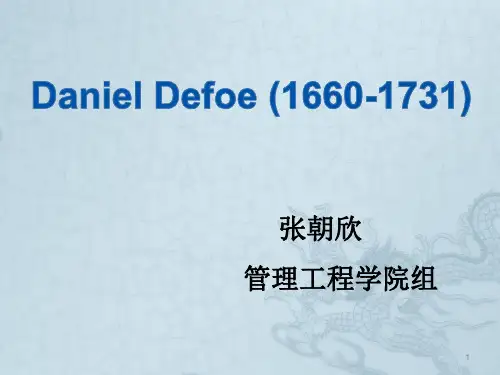
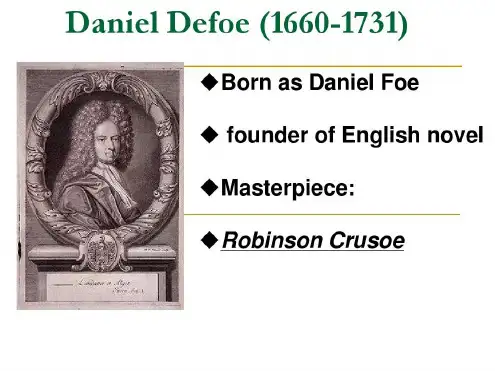
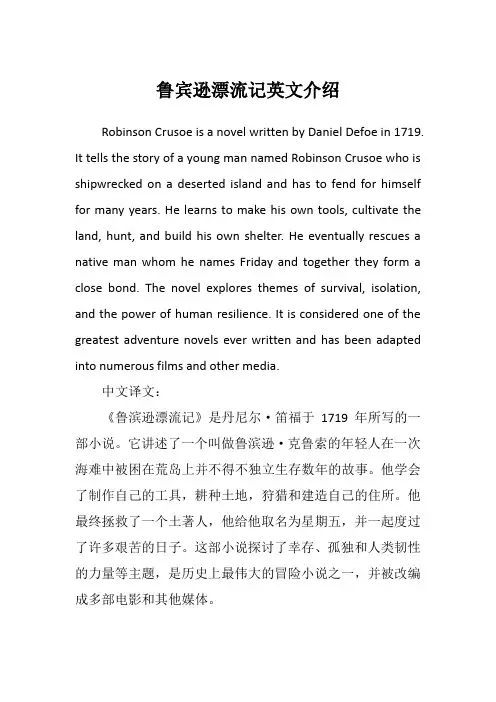
鲁宾逊漂流记英文介绍Robinson Crusoe is a novel written by Daniel Defoe in 1719. It tells the story of a young man named Robinson Crusoe who is shipwrecked on a deserted island and has to fend for himself for many years. He learns to make his own tools, cultivate the land, hunt, and build his own shelter. He eventually rescues a native man whom he names Friday and together they form a close bond. The novel explores themes of survival, isolation, and the power of human resilience. It is considered one of the greatest adventure novels ever written and has been adapted into numerous films and other media.中文译文:《鲁滨逊漂流记》是丹尼尔·笛福于1719年所写的一部小说。
它讲述了一个叫做鲁滨逊·克鲁索的年轻人在一次海难中被困在荒岛上并不得不独立生存数年的故事。
他学会了制作自己的工具,耕种土地,狩猎和建造自己的住所。
他最终拯救了一个土著人,他给他取名为星期五,并一起度过了许多艰苦的日子。
这部小说探讨了幸存、孤独和人类韧性的力量等主题,是历史上最伟大的冒险小说之一,并被改编成多部电影和其他媒体。
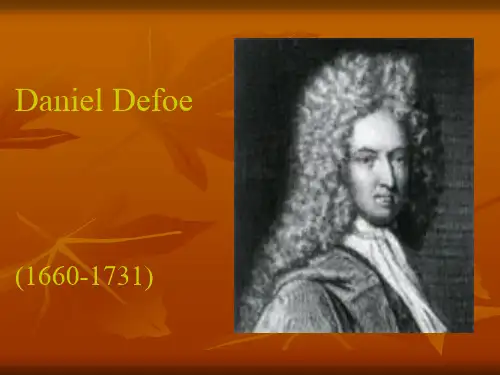
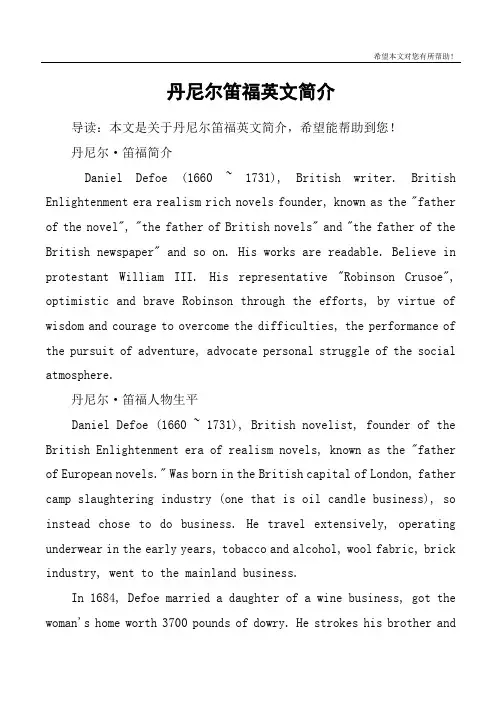
丹尼尔笛福英文简介导读:本文是关于丹尼尔笛福英文简介,希望能帮助到您!丹尼尔·笛福简介Daniel Defoe (1660 ~ 1731), British writer. British Enlightenment era realism rich novels founder, known as the "father of the novel", "the father of British novels" and "the father of the British newspaper" and so on. His works are readable. Believe in protestant William III. His representative "Robinson Crusoe", optimistic and brave Robinson through the efforts, by virtue of wisdom and courage to overcome the difficulties, the performance of the pursuit of adventure, advocate personal struggle of the social atmosphere.丹尼尔·笛福人物生平Daniel Defoe (1660 ~ 1731), British novelist, founder of the British Enlightenment era of realism novels, known as the "father of European novels." Was born in the British capital of London, father camp slaughtering industry (one that is oil candle business), so instead chose to do business. He travel extensively, operating underwear in the early years, tobacco and alcohol, wool fabric, brick industry, went to the mainland business.In 1684, Defoe married a daughter of a wine business, got the woman's home worth 3700 pounds of dowry. He strokes his brother andbrother and brother as a partner to start a small department store trading. In addition, it is still doing business in Europe, often making wine trade to increase revenue. However, he followed the puritan principle in the "drunken" business, against the sale of gin and the usual spirits.In 1685 Defoe attended the rebellion of the Duke of Monmouth against the Catholic kings.In 1688 the Dutch believe in protestant William led his army to land in England, inherited the British throne, Defoe participated in his army.In 1692 he was bankrupt, debt amounted to 17,000 pounds, and later failed, and thus had to use a variety of ways to make a living. He has acted as a secret intelligence officer of the government, designed various development undertakings, and engaged in writing.In 1698 he published "on the development", to promote highway construction, bank, bankruptcy law, set up crazy homes, do water and fire insurance, levy income tax, school and so on.In 1701 he published a satirical poem "real British", that there is no purebred British, against the aristocratic Catholic forces, for the foreign faith in protestant William III defense. This song is printed with version 9.1702 issued a political theory "to eliminate the different sects of the shortcut", with irony, against the national religion oppression of different sects, clever writing, began to be seen isagainst Christians, after being found, by the fine and jail punishment, imprisonment 6 Month, flog three times, but by the people of London as a hero. In the prison he imitated the Greek poet pinarross's song to write a "lie" (1703), satirical law unfairly.In 1704, Daniel Defoe won the "Review" magazine for Whig's party leader Harry, which was supported by Harry's England-Scottish coalition policy. After 11 years he has been between England and Scotland, as Harry and his successor Toli pie Gordorfen secret intelligence officer, to collect public opinion. During this period, he wrote a short term imprisonment, but never terminated for the Whig party in power to collect intelligence, newspaper, write articles.Defoe began writing novels at the age of 59. In 1719 the first novel, "Robinson Crusoe" published, popular, he succeeded in shaping the image of an idealized bourgeois, in the history of European novels is a pioneering work. The same year and published a sequel.1720 and wrote "Robinson's pensive set." Since then, he has written several novels: "Captain Singleton" "Moore Flanders" "Colonel Jack" and so on. In addition, he also wrote a number of biographies, such as "deaf man Campbell", "peter Emperor Ji", several domestic and foreign travel, such as "New Global Travel" "Roberts Captain four travel" and so on. His novel to "Robinson Crusoe" spread the most widely, is considered his masterpiece.It is said that Flute has been associated with 26 magazines, some people call him "the father of modern news reports." His works,including a large number of political books, a total of 250 species, and both are the need to develop the development of the bourgeoisie, write the city middle class interested and concerned about the issue. (1722), written in 1665 London plague, the occurrence of the plague, the spread of the plague, the plague of the plague, the plague of the plague, It caused terror and panic, as well as the number of deaths, the situation of the escape was written as immersive. At that time the French Marseille plague epidemic, causing people's special attention, Defoe's work to meet the public's curiosity on plague.After the "Robinson Crusoe", he wrote some excellent works, including "Moore Flanders" and "Colonel Jack", which were classified as British literary classics."Robinson Crusoe" best-selling prompted him to write "Robinson Crusoe sequel", he let his hero made a global travel, Robinson's most journey is starting from Beijing, across Siberia to Russia Hangeersk. He has not been to China, but in the sequel talked about the time the European people do not know Heilongjiang.Defoe was too comfortable in his later years, and wrote a few books, some creditors have died, he sold a small brick factory with a small amount of money back to other people's debt, still not far from London to purchase A suite. However, he also has ups and downs, and creditors live in harmony, and could not expect a creditor's widow made a new lawsuit, the judicial machine again spin up, he was to avoid the property was confiscated, the housing and property transferto his son The His son is a capable journalist, who wants him or a villain. Defoe wrote: "I put myself in his subordinate position, trust him, entrusted him to other children who have no living security, and he has not even compassionate, tortured the children, tortured himself The unfortunate mother, who lived a very rich life.The flute of the seventies had to hide from the debt, and he had rented rooms in the center of London's old town.On the day of the 1731 day, the London Courier reported that the evening of the evening, the famous Daniel Defoe died in his own apartment in the Canakan Boulevard. The British love to write their own pretense, written cute, witty and brief. Defoe also wrote that he wanted to write on his tombstone: "Daniel Defoe". But they are another consideration, they wrote on his tombstone: "Daniel Defoe:" Robinson Crusoe "author.丹尼尔·笛福人物评价Defoe lives in the period of capitalist development, he belongs to the bourgeoisie, he is the middle class bourgeois spokesperson.Defoe life is most concerned about the development of capitalism, he strongly praised the bourgeoisie, he believes that the core issue of a country's development is the development of trade. "Give us trade is to give us everything", "trade is the world's prosperous life", which is his most fundamental proposition. Because he thought that trade made the manufacturing and maritime industry development, so that people have work, there are clothing to wear, have food,materials and therefore can maintain high prices, and can maintain a high rent, so the upper society also benefit. As long as there are hard-working people to develop trade, any place will flourish. All his economic works and some political works have played this proposition, put forward a number of specific recommendations. Defarge's idea of developing the economy is conducive to the development of the British society, but he enthusiastically supports the colonial system, proposes to seize and operate the colonies, propose ways to expand trade with backward countries, and embrace slaves. All this shows his class limitations.Defoe was so disgusted with the aristocrats who were proud of the door, and he tried to celebrate the bourgeoisie, not the upper class, and criticized the "gentleman" who looked down on "civilians". He said that the ancestor of the people is working. He stressed that businessmen are useful people, and gentlemen change businessmen, businessmen change the gentleman is a reasonable thing, and so on. praised his class, he in the "Rosanna" where there is a paragraph of the most obvious:Baron Robert and my view of the businessman is exactly the same. Baron Robert said - I think he is perfectly correct - an authentic businessman is the best gentleman in the country, both in knowledge, in the ritual or in judgment, the businessman is stronger than many nobles. Once they control the world, although there is no real estate, but also rich than the real estate of the gentleman.Defoe's attitude towards the working people is twofold. He believes that the root of the crime is poor, rich people are not guilty. Moore Flanders and Rohsana are embraced by the glorious path, because of poverty, so he is also sympathetic to the two characters. He advocated the development of industry and commerce to make the people work. But on the other hand, he was the workers working long time, low wages, underage children will work and other brutal exploitation of the phenomenon as a matter of course. This is the employer's point of view.Defoe accepted Locke's political thought, opposes despotism, and advocates civil rights. At that time the British parliament was the upper echelon of politicians fighting infighting places, bribing and all kinds of dirty means of public. Workers, peasants and the petty bourgeoisie are not represented at all. Defoe advocates that the basic right of man is that no one, including the king, the cabinet, and the congress, can not be violated. "The British are neither kings nor slaves of Congress." Defoe advocated freedom of religious belief, although the British did not like France, Spain, as in the religious issue of extreme autocracy, but the religion outside the protestant denominations and Catholic believers are also a variety of restrictions. He is a non-state religion protestant, who is a petty bourgeoisie who demands a political system that is in line with the "revolutionary principle" and demands freedom of belief. Defoe is the spokesman for this faction. He argues that the people should beeducated and advocated for women to be educated.In general, the thought of Defoe was progressive at the time, but the limitations of his thought were great. The bourgeoisie was still a progressive class and still struggled against feudal forces. Conservative aristocrats, landlords do not produce, sit huge rent income, the bourgeoisie organized large-scale industrial and commercial promotion of social development.The petty bourgeoisie, on the one hand, has the same place as the big bourgeoisie, and on the other, with the ruling class big bourgeoisie and aristocrats, and demand more liberal politics. Therefore, Defoe's views on the development of capitalism, against feudal forces, against political undemocratic, and against monopolies are all progressive. But he was subject to the constraints of the times and class prejudice and colonial system and racial discrimination, which is consistent with the big bourgeoisie, is reactionary. To the working people, he is only concerned with making them work and producing wealth, which coincides with the demands of capitalism. Defoe thought on this duality, clearly manifested in his literary works.Defoe is deeply understood by the characters he describes, and he is good at writing individuals to overcome difficulties in an unfavorable environment. His hero is intelligent, energetic, unbelief, believe in "common sense". plot, structure does not fall ax chisel trace. He is particularly good at describing theenvironment, the details of the fidelity, fictional scene written so that people as immersive.Defoe was so disgusted with the aristocrats who were proud of the door, and he tried to celebrate the bourgeoisie, not the upper class, and criticized the "gentleman" who looked down on "civilians". He said that the ancestor of the people is working. He stressed that businessmen are useful people, and gentlemen change businessmen, businessmen change the gentleman is a reasonable thing, and so on. praised his class, he in the "Rosanna" where there is a paragraph of the most obvious:Baron Robert and my view of the businessman is exactly the same. Baron Robert said - I think he is perfectly correct - an authentic businessman is the best gentleman in the country, both in knowledge, in the ritual or in judgment, the businessman is stronger than many nobles. Once they control the world, although there is no real estate, but also rich than the real estate of the gentleman.。
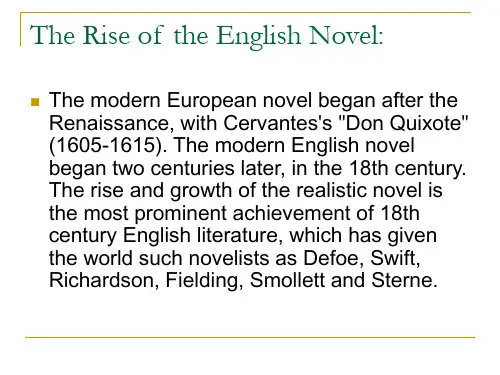

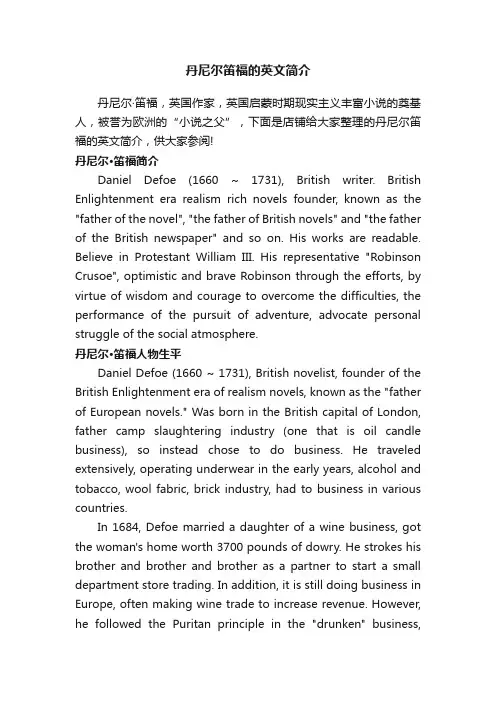
丹尼尔笛福的英文简介丹尼尔·笛福,英国作家,英国启蒙时期现实主义丰富小说的奠基人,被誉为欧洲的“小说之父”,下面是店铺给大家整理的丹尼尔笛福的英文简介,供大家参阅!丹尼尔·笛福简介Daniel Defoe (1660 ~ 1731), British writer. British Enlightenment era realism rich novels founder, known as the "father of the novel", "the father of British novels" and "the father of the British newspaper" and so on. His works are readable. Believe in Protestant William III. His representative "Robinson Crusoe", optimistic and brave Robinson through the efforts, by virtue of wisdom and courage to overcome the difficulties, the performance of the pursuit of adventure, advocate personal struggle of the social atmosphere.丹尼尔·笛福人物生平Daniel Defoe (1660 ~ 1731), British novelist, founder of the British Enlightenment era of realism novels, known as the "father of European novels." Was born in the British capital of London, father camp slaughtering industry (one that is oil candle business), so instead chose to do business. He traveled extensively, operating underwear in the early years, alcohol and tobacco, wool fabric, brick industry, had to business in various countries.In 1684, Defoe married a daughter of a wine business, got the woman's home worth 3700 pounds of dowry. He strokes his brother and brother and brother as a partner to start a small department store trading. In addition, it is still doing business in Europe, often making wine trade to increase revenue. However, he followed the Puritan principle in the "drunken" business,against the sale of gin and the usual spirits.In 1685 Defoe attended the rebellion of the Duke of Monmouth against the Catholic kings.In 1688 the Dutch believe in Protestant William led his army to land in England, inherited the British throne, Defoe participated in his army.In 1692 he was bankrupt, debt amounted to 17,000 pounds, and later failed, and thus had to use a variety of ways to make a living. He has acted as a secret intelligence officer of the government, designed various development undertakings, and engaged in writing.In 1698 he published "on the development", to promote highway construction, bank, bankruptcy law, set up crazy homes, do water and fire insurance, levy income tax, school and so on.In 1701 he published a satirical poem "real British", that there is no purebred British, against the aristocratic Catholic forces, for the foreign faith in Protestant William III defense. This song is printed with version 9.1702 issued a political theory "to eliminate the different sects of the shortcut", with irony, against the national religion oppression of different sects, clever writing, began to be seen is against Christians, after being found, by the fine and jail punishment, imprisonment 6 Month, flog three times, but by the people of London as a hero. In the prison he imitated the Greek poet Pinarross's song to write a "lie" (1703), satirical law unfairly.In 1704, Daniel Defoe won the "Review" magazine for Whig's party leader Harry, which was supported by Harry's England-Scottish coalition policy. After 11 years he has been between England and Scotland, as Harry and his successor Toli Pie Gordorfen secret intelligence officer, to collect public opinion.During this period, he wrote a short term imprisonment, but never terminated for the Whig party in power to collect intelligence, newspaper, write articles.Defoe began writing novels at the age of 59. In 1719 the first novel "Robinson Crusoe" published, popular, he succeeded in shaping the image of an idealized bourgeois, in the history of European novels is a pioneering work. The same year and published a sequel.1720 and wrote "Robinson's pensive set." Since then, he has written several novels: "Captain Singleton" "Moore Flanders" "Colonel Jack" and so on. In addition, he also wrote a number of biographies, such as "deaf man Campbell", "Peter Emperor Ji", several domestic and foreign travel, such as "New Global Travel" "Roberts Captain four travel" and so on. His novel to "Robinson Crusoe" spread the most widely, is considered his masterpiece.It is said that Flute has been associated with 26 magazines, some people call him "the father of modern news reports." His works, including a large number of political books, a total of 250 species, and both are the need to develop the development of the bourgeoisie, write the city middle class interested and concerned about the issue. (1722), written in 1665 London plague, the occurrence of the plague, the spread of the plague, the plague of the plague, the plague of the plague, It caused terror and panic, as well as the number of deaths, the situation of the escape was written as immersive. At that time the French Marseille plague epidemic, causing people's special attention, Defoe's work to meet the public's curiosity on plague.After the "Robinson Crusoe", he wrote some excellent works, including "Moore Flanders" and "Colonel Jack", which were classified as British literary classics."Robinson Crusoe" best-selling prompted him to write "Robinson Crusoe sequel", he let his hero made a global travel, Robinson's most journey is starting from Beijing, across Siberia to Russia Hangeersk. He has not been to China, but in the sequel talked about the time the European people do not know Heilongjiang.Defoe was too comfortable in his later years, and wrote a few books, some creditors have died, he sold a small brick factory with a small amount of money back to other people's debt, still not far from London to purchase A suite. However, he also has ups and downs, and creditors live in harmony, and could not expect a creditor's widow made a new lawsuit, the judicial machine again spin up, he was to avoid the property was confiscated, the housing and property transfer to his son The His son is a capable journalist, who wants him or a villain. Defoe wrote: "I put myself in his subordinate position, trust him, entrusted him to other children who have no living security, and he has not even compassionate, tortured the children, tortured himself The unfortunate mother, who lived a very rich life.The flute of the seventies had to hide from the debt, and he had rented rooms in the center of London's old town.On the day of the 1731 day, the London Courier reported that the evening of the evening, the famous Daniel Defoe died in his own apartment in the Canakan Boulevard. The British love to write their own pretense, written cute, witty and brief. Defoe also wrote that he wanted to write on his tombstone: "Daniel Defoe". But they are another consideration, they wrote on his tombstone: "Daniel Defoe:" Robinson Crusoe "author.。
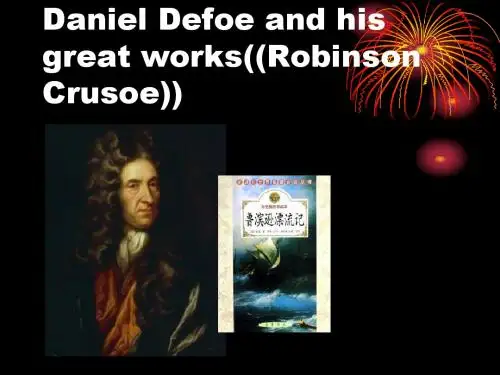
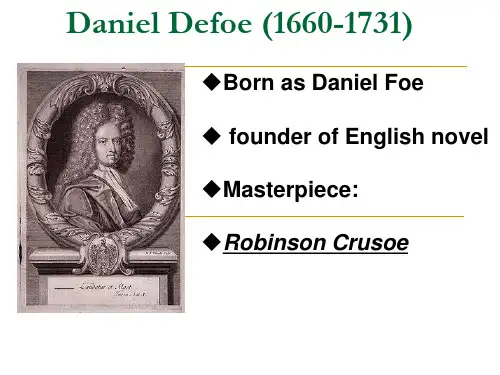
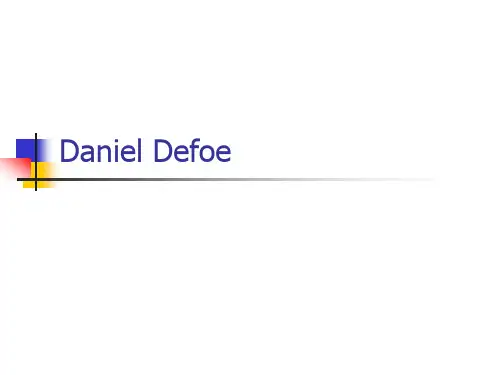
Daniel Defoe(丹尼尔•笛福) (1660--1731)●Introduction:笛福是小说的最早的倡导者,并为这种新兴文学形式的普及作出了极大贡献,被认为是英国小说之父(the Farther of the English Fiction)。
笛福是一个具有多种才能的多产作家。
共写了500多本不同类型的书和小册子,并与26家杂志有联系,其写作的主题和题材包括政治、犯罪、宗教、婚姻、心理和超自然等。
他也被称为“现代新闻报道之父”。
他的作品,包括大量政论册子,无一不是投合资产阶级发展的需要,写城市中产阶级感兴趣和关心的问题。
●His works:The Life and Strange Surprising Adventures of Robinson Crusoe《鲁滨逊漂流记》(现在也称Robinson Crusoe)(1719);Captain Singleton《辛格顿船长》(1720);Moll Flanders 《摩尔·弗兰德斯》(1722);A Journal of the Plague Year《大疫年日记》(1722);Roxana《罗克萨娜》(1724);Colonel Jacques《杰克上校》(1722)。
●Appreciation: an excerpt from Chapter Ⅳ.My thoughts were now wholly employed about securing my self againsteither savages, if any should appear, or wild beasts, if any were in the island;and I had many thoughts of the method how to do this, and what kind ofdwelling to make, whether I should make me a cave in the earth, or a tentupon the earth: And, in short, I resolved upon both, the manner anddescription of which, it may not be improper to give an account of.I soon found the place I was in was not for my settlement, particularlybecause it was upon a low moorish ground near the sea, and I believedwould not be wholesome, and more particularly because there was no fresh water near it, so I resolved tofind a more healthy and more convenient spot of ground.I consulted several things in my situation which I found would be proper for me. First, health, andfresh water I just now mentioned. Secondly, shelter from the heat of the sun. Thirdly, security fromravenous creatures, whether men or beasts. Fourthly, a view to the sea, that if God sent any ship in sight, Imight not lose any advantage for my deliverance, of which I was not willing to banish all my expectationyet.In search of a place proper for this, I found a little plain on the side of a rising hill; whose fronttowards this little plain, was steep as a house-side, so that nothing could come down upon me from the top;on the side of this rock there was a hollow place worn a little way in like the entrance or door of a cave,but there was not really any cave or way into the rock at all.On the flat of the green, just before this hollow place, I resolved to pitch my tent: This plain was notabove an hundred yards broad, and about twice as long, and lay like a green before my door, and at the end of it descended irregularly every way down into the low-grounds by the sea-side. It was on the north-northwest side of the hill, so that I was sheltered from the heat every day, till it came to a west and by south sun, or thereabouts, which in those countries is near the setting.Before I set up my tent, I drew a half circle before the hollow place, which took in about ten yards in its semi-diameter from the rock, and twenty yards in its diameter, from its beginning and ending.In this half circle I pitched two rows of strong stakes, driving them into the ground till they stood very firm like piles, the biggest end being out of the ground about five foot and a half, and sharpened on the top: The two rows did not stand above six inches from one another.Then I took the pieces of cable which I had cut in the ship, and I laid them in rows one upon another, within the circle, between these two rows of stakes, up to the top, placing other stakes in the in-side, leaning against them, about two foot and a half high, like a spur to a post, and this fence was so strong, that neither man or beast could get into it or over it. This cost me a great deal of time and labour, especially to cut the piles in the woods, bring them to the place, and drive them into the earth.The entrance into this place I made to be not by a door, but by a short ladder to go over the top, which ladder, when I was in, I lifted over after me, and so I was completely fenced in, and fortified as I thought, from all the world, and consequently slept secure in the night, which otherwise I could not have done, though, as it appeared afterward, there was no need of all this caution from the enemies that I apprehended danger from.Into this fence or fortress, with infinite labour, I carried all my riches, all my provisions, ammunition and stores, of which you have the account above. And I made me a large tent, which, to preserve me from the rains that in one part of the year are very violent there, I made double, viz. One smaller tent within, and one larger tent above it, and covered the uppermost with a large tarpaulin which I had saved among the sails.And now I lay no more for a while in the bed which I had brought on shore, but in a hammock, which was indeed a very good one, and belonged to the mate of the ship.Into this tent I brought all my provisions, and every thing that would spoil by the wet, and having thus enclosed all my goods, I made up the entrance, which till now I had left open, and so passed and re-passed, as I said, by a short ladder.When I had done this, I began to work my way into the rock, and bringing all the earth and stones that I dug down out through my tent, I laid them up within my fence in the nature of a terrace, that so it raised the ground within about a foot and a half; and thus I made me a cave just behind my tent, which served me like a cellar to my house.。
笛福英文简介作者简介:Daniel Defoe (1660-1731) English novelist, pamphleteer, and journalist, is most famous as the author of Robinson Crusoe (1719), a story of a man shipwrecked alone on an island. Along with Samuel Richardson, Defoe is considered the founder of the English novel.Defoe was born as the son of James Foe, a butcher of Stroke Newington. He studied at Charles Morton's Academy, London. Although his Nonconformist father intended him for the ministry, Defoe plunged into politics and trade, traveling extensively in Europe. In the early 1680s Defoe was a commission merchant in Cornhill but went bankrupt in 1691. In 1684 he married Mary Truffle; they had two sons and five daughters.Defoe earned fame and royal favor with his satirical poem "The True born Englishman" (1701). In 1702 Defoe wrote his famous pamphlet The Shortest Way With Dissenters. Himself a Dissenter he mimicked the extreme attitudes of High Anglican Tories and pretended to argue for the extermination of all Dissenters. Nobody was amused; Defoe was arrested and pilloried in May 1703. While in prison Defoe wrote a mock ode, "Hymn To The Pillory" (1703). The poem was sold in the streets, the audience drank to his health while he stood in the pillory and read aloud his verses.When the Tories fell from power Defoe continued to carry out intelligence work for the Whig government. In his own days Defoe was regarded as an unscrupulous, diabolical journalist.Defoe was one of the first to write stories about believable characters in realistic situations using simple prose. He achievedliterary immortality when in April 1719 he published Robinson Crusoe, which was based partly on the memoirs of voyagers and castaways, such as Alexander Selkirk. During the remaining years, Defoe concentrated on books rather than pamphlets. Among his works are MollFlanders(1722), A Journal Of The Plague Year (1722) and Captain Jack(1722) Hislast great work of fiction, Roxana, appeared in 1724. In the 1720s Defoe had ceased to be politically controversial in his writings, and he produced several historical works, a guide book and The Great Law Of Subordination Considered (1724), an examination of the treatment of servants.Phenomenally industrious, Defoe produced in his last years also works involving the supernatural, The Political History of The Evil (1726) and An Essay On The History And Reality of apparitions (1727). He died on 26 April 1731, at his lodgings in Ropewalker’s Alley, Moorefield’s.重要作品简介:Robinson CrusoeRobinson Crusoe is an Englishman from the town of York in the seventeenth century, the youngest son of a merchant of German origin. Encouraged by his father to study law, Crusoe expresses his wish to go to sea instead. His family is against Crusoe going out to sea, and his father explains that it is better to seek a modest, secure life for oneself. Initially, Robinson is committed to obeying his father, but he eventually succumbs to temptation and embarks on a ship bound for London with a friend. When a storm causes the near deaths of Crusoe and his friend, the friend is dissuaded from sea travel, but Crusoe still goes on to set himself up as merchant on a ship leaving London.This trip is financially successful, and Crusoe plans another, leaving his early profits in the care of a friendly widow. The second voyage does not prove as fortunate: the ship is seized by Moorish pirates, and Crusoe is enslaved to a potentate in the North African town of Sallee. While on a fishing expedition, he and a slave boy break free and sail down the African coast. A kindly Portuguese captain picks them up, buys the slave boy from Crusoe, and takes Crusoe to Brazil. In Brazil, Crusoe establishes himself as a plantation owner and soon becomes successful. Eager for slave labor and its economic advantages, he embarks on a slave-gathering expedition to West Africa but ends up shipwrecked off of the coast of Trinidad.Crusoe soon learns he is the sole survivor of the expedition and seeks shelter and food for himsel f. He returns to the wreck’s remains twelve times to salvage guns, powder, food, and other items. Onshore, he finds goats he can graze for meat and builds。
英语学习资料:丹尼尔·笛福英语散文:TheEducationofWomen丹尼尔·笛福英语散文:The Education of Women丹尼尔·笛福,英国作家,新闻记者。
英国启蒙时期现实主义丰富的小说的奠基人,被誉为英国和欧洲的“小说之父”。
笛福对他所描写的人物理解较深,他善于写个人在不利的环境中克服困难。
他的主人公有聪明才智,充满活力,不信天命,相信“常识”。
情节结构不落斧凿痕迹。
他尤其擅长描写环境,细节逼真,虚构的情景写得使人如身临其境。
I have often thought of it as one of the most barbarous customs in the world, considering us as a civilized and a Christian country, that we deny the advantages of learning to women. We reproach the sex every day with folly and impertinence; while I am confident, had they the advantages of education equal to us, they would be guilty of less than ourselves.One would wonder, indeed, how it should happen that women are conversible at all; since they are only beholden to natural parts, for all their knowledge. Their youth is spent to teach them to stitch and sew or make baubles. They are taught to read, indeed, and perhaps to write their names, or so; and that is the height of a woman’s education. And I would but a sk any who slight the sex for their understanding, what is a man (a gentleman, I mean) good for, that is taught no more? I need not give instances, or examine the character of a gentleman, with a good estate, or a good family, and with tolerable parts; and examine what figure he makes for want of education.The soul is placed in the body like a rough diamond; and must be polished, or the luster of it will never appear. And ’tis manifest, that as the rational soul distinguishes us from brutes; so education carries on the distinction, and makes some less brutish than others. This is too evident to need any demonstration. But why then should women be denied the benefit of instruction? If knowledge and understanding had been useless additions to the sex, GOD Almighty would never have given them capacities; for he made nothing needless. Besides, I would ask such, What they can see in ignorance, that they should think it a necessary ornament to a woman? or how much worse is a wise woman than a fool? or what has the woman done to forfeit the privilege of being taught? Does she plague us with her pride and impertinence? Why did we not let her learn, that she might have had more wit? Shall we upbraid women with folly, when ’tis only the error of this inhuman custom, t hat hindered them from being made wiser?The capacities of women are supposed to be greater, and their senses quicker than those of the men; and what they might be capable of being bred to, is plain from some instances of female wit, which this age is not without. Which upbraids us with Injustice, and looks as if we denied women the advantages of education, for fear they should vie with the men in their improvements.[They] should be taught all sorts of breeding suitable both to their genius and quality. And in particular, Music and Dancing; which it would be cruelty to bar the sex of, because they are their darlings. But besides this, they should be taught languages, asparticularly French and Italian: and I would venture the injury of giving a woman more tongues than one. They should, as a particular study, be taught all the graces of speech, and all the necessary air of conversation; which our mon education is so defective in, that I need not expose it. They should be brought to read books, and especially history; and so to read as to make them understand the world, and be able to know and judge of things when they hear of them.To such whose genius would lead them to it, I would deny no sort of learning; but the chief thing, in general, is to cultivate the understandings of the sex, that they may be capable of all sorts of conversation; that their parts and judgments being improved, they may be as profitable in their conversation as they are pleasant.Women, in my observation, have little or no difference in them, but as they are or are not distinguished by education. Tempers, indeed, may in some degree influence them, but the main distinguishing part is their Breeding.The whole sex are generally quick and sharp. I believe, I may be allowed to say, generally so: for you rarely see them lumpish and heavy, when they are children; as boys will often be. If a woman be well bred, and taught the proper management of her natural wit, she proves generally very sensible and retentive.And, without partiality, a woman of sense and manners is the finest and most delicate part of God's Creation, the glory of Her Maker, and the great instance of His singular regard to man, Hisdarling creature: to whom He gave the best gift either God could bestow or man receive. And ’tis the sordidest piece of folly and ingratitude in the world, to withhold from the sex the due luster which the advantages of education gives to the natural beauty of their minds.。